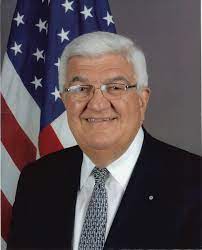Remembering Tom Korologos (1933-2024)
 By Bruce Gregory
By Bruce GregoryTom Korologos is remembered by many as a Nixon/Reagan/Dole Republican operative, known as the “101st Senator,” a Senate confirmation expert who advised nominees of both parties (William Rehnquist, Antonin Scalia, Robert Gates, Susan Rice, and George Tenet among others), and a top-tier Washington lobbyist (Major League Baseball one of many marquee clients).
He was a second-generation Greek-American from Salt Lake City where his parents operated a tavern. He served in the Air Force as an information officer, earned journalism degrees at the University of Utah and Columbia University, and worked for the Salt Lake Tribune, the New York Herald Tribune, and other media organizations. Early on he joined the staff of Senator Wallace F. Bennett (R-UT) and there launched his storied Washington career.
US public diplomacy and broadcasting practitioners, however, will remember him best for his extraordinary service on the bipartisan US Advisory Commission on Public Diplomacy and the Broadcasting Board of Governors (BBG).
Korologos was appointed to the Commission by President Reagan in 1981 to succeed historian John Hope Franklin. He served first as a member and then as vice chair until 1990 when he was appointed Commission chair by President George H. W. Bush. He remained on the Commission until 1994. From 1995 to 2002 he was a founding member of the BBG. He was US ambassador to Belgium from 2004-2007.
I had just joined the Commission’s staff when he was appointed and had the privilege of working as its executive director during his 13 years on the Commission. A master of Washington’s folkways, he taught many lessons that broadened my understanding of national politics and its implications for public diplomacy.
He was known for his affable personal style and great sense of humor. He was intensely loyal, befriending Senators of both parties and Senate pages alike. He had a knack for charming adversaries and a lifelong habit of focusing on what truly mattered in friendships, life, and politics.
He maintained close ties with former Senators including two who served on the Commission. “Once a Senator, always a Senator,” he once told me. Whereupon he was always “Mr. Chairman” during our conversations in his post-Commission years including at our last meeting when we participated on the Advisory Commission’s 75th anniversary panel at George Washington University in February 2024.
“Chairman Korologos” genuinely cared about public diplomacy’s mission and the concerns of its practitioners at all levels. What follows are examples from a very long list.
He listened intently to field officers abroad and at home, valuing their insights and leveraging their experiences in Washington’s bureaucratic battles. He routinely went to bat for USIA and BBG budget requests — the “150 accounts.” He pressed hard for VOA’s modernization. He was a staunch opponent of TV Martí and questioned language service duplication in US international broadcasting. He succeeded in gaining accreditation for VOA’s correspondents in the Congressional press gallery over the opposition of US news organizations. He fought hard to keep the National Endowment for Democracy afloat during its early days when its survival was not assured. He opened doors for USIA and VOA directors, cleaned up after their occasional missteps, listened to their private complaints, and offered advice pro bono when asked — the kind of advice for which “paying clients” paid huge sums.
His partisan Republican politics were never in doubt. But partisanship never influenced his Commission work — or indeed activities of any Commission members over the years. There were differences in practitioner communities of course, sometimes intense differences, on public diplomacy’s priorities, structures, and methods. The case of the broadcasting grantee, Radio Free Asia (RFA), makes the point.
In the early 1990s — soon after images of pro-democracy demonstrators in Tiananmen Square caught the world’s attention and Vaclev Havel was voicing heartfelt thanks for Radio Free Europe’s Cold War broadcasts — Senators Joe Biden (D-DE) and Jesse Helms (R-NC) teamed up from opposite ends of the political spectrum to create RFA. It became a central issue in one of those Washington bureaucratic tangles that have been hallmarks of American diplomacy’s public dimension.
Chairman Korologos championed voices in USIA, VOA, and elsewhere who argued the US did not need two government-funded entities broadcasting in Mandarin and other Asian languages. He wrote an op-ed in The Washington Post, met with lawmakers, framed recommendations in Commission reports, and testified before Congress and blue-ribbon panels on post-Cold War US broadcasting. When RFA was authorized in the International Broadcasting Act of 1994, he cheerfully conceded defeat and moved on. His campaign was no barrier to his Senate confirmation a year later as a founding member of the Broadcasting Board of Governors.
Senator Biden’s comments during a Foreign Relations Committee hearing in 1992 captured the man and the moment. “[T]here are some very articulate, fine men like Mr. Korologos who[m] I have worked with for years and years,” the Senator declared, noting their opposing views on RFA, “one of the most powerful unelected officials here and someone who seldom holds a position, but who has great insight and I hope he realizes I said that about him. I see him more than my colleagues. He is outside the elevators so often to lobby us on votes, but all kidding aside, I do have great respect for him.”
Tom Kolorogos was my friend and mentor for more than four decades. He was a great American whose political skills and deep dedication to public diplomacy and its practitioners were respected by all who knew him. He will be greatly missed.
Bruce Gregory is a visiting scholar at George Washington University’s Institute for Public Diplomacy and Global Communication and a non-resident faculty fellow at the University of Southern California’s Center on Public Diplomacy. From 1985 to 1998, he was executive director of the US Advisory Commission on Public Diplomacy. You can contact him at BGregory1@aol.com.